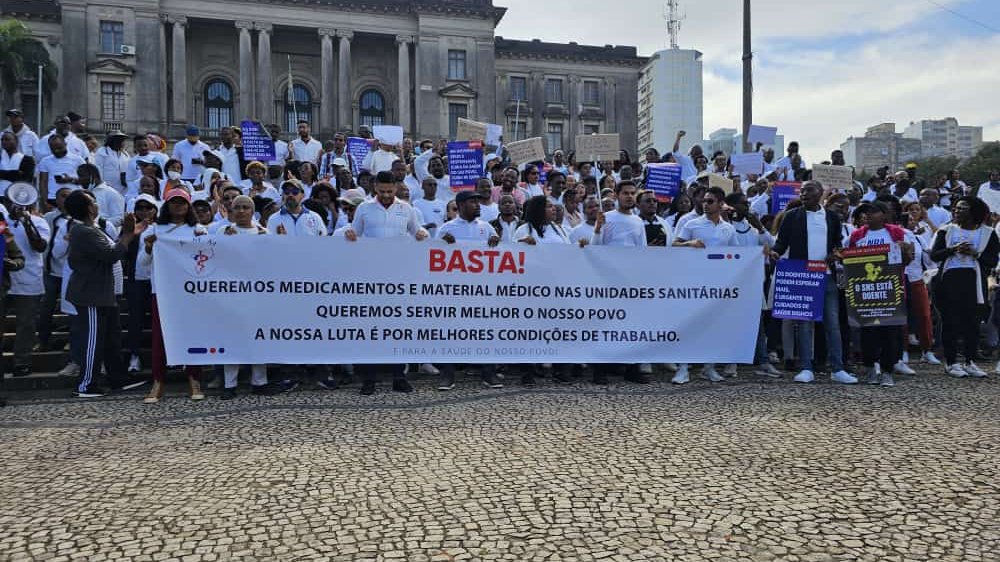The National Health Service in Mozambique is facing challenging times. Weakened by a lack of funding and poor governance, it confronts frequent stockouts of essential medicines and supplies, and shortage of health personnel. For the past few months, the delivery of healthcare services has been further affected by strikes in this sector.
After a broad group of health workers suspended their strike in the hope that the government would offer concrete answers to their demands — including adequate supplies of personal protective equipment (PPE) and an increase in salaries — medical doctors from the Mozambican Medical Association (Associação Médica de Moçambique, AMM) launched a strike on July 10.
The demands of the doctors mostly mirror those of other health workers, and to a large extent, those of workers in public services in general. Tichaona Fambisa, Sub-Regional Secretary for Southern Africa at Public Services International, notes that public service employees have supported the doctors’ action.
“When workers see an association that has the courage to stand up to the government, they tend to support them, because they understand that while they may be raising issues that are specific to the medical profession, they’re also speaking for those that are not organized, those workers that do not have an opportunity to stand up to the government,” Fambisa says.
The AMM has remarkably sustained their action for an extended period. This accomplishment is particularly noteworthy given the limited room for formal worker organization within the country. Fambisa points out that for years, the government has avoided acknowledging trade unions for public sector workers in an attempt to circumvent collective bargaining. Because of that, professional associations such as AMM often step in to advocate for better labor rights.
“At first, [the government] refused to engage with [associations] on salary issues because they would say, ‘You are not trade unions. You’re an association. Your focus should be on professional matters’,” recounts Fambisa.
Patients call for solutions
As progress in negotiations has stalled for over a month, patients are increasingly voicing their discontent regarding the government’s handling of the situation. Health care services apart from emergency care have remained restricted for the whole duration of the strike. Reports from the Citizens’ Observatory for Health (Observatório do Cidadão para Saúde, OCS) point out that some patients perceive the government’s inaction as neglect and disrespect.
Jorge Matine, Executive Director of the OCS, says that patients are facing “a strike on the one side, and a crisis on the other.” Violeta Bila, coordinator of the Alliance for Health, echoes his sentiment. According to Bila’s observations, patients are increasingly weighing their options before seeking hospital care, unsure about the staff situation. This means that even patients in need of urgent medical attention might opt to stay away from hospitals, leading to deaths and serious health complications. That should be enough to make the resolution of the negotiations between government and the doctors a priority for everyone, Bila insists.
The impact of international financial institutions
As the AMM broadened its list of demands to incorporate issues that affect everyone, like medicine shortages, more groups are likely to rally behind their cause, possibly increasing pressure on the government and opening the doors for closure. Yet many of the problems highlighted by striking health workers over the past months will require much more than what Tichaona Fambisa calls short-term, firefighting measures.
Mozambique has gone from being among the countries in Sub-Saharan Africa with one of the lowest mortality rates of 411 per 100,000 in the 1980s to a ratio of 430 maternal deaths per 100,000 in 2013. The introduction of poverty reduction programs by the International Monetary Fund (IMF) and the World Bank led to a decline in care quality and an escalation in absolute poverty rates. Trapped in a cycle of debt, successive Mozambican administrations struggled to allocate enough resources to public services and public sector employment.
At present, there are negotiations in the Mozambican government to increase the health budget. But these are also not going smoothly. Violeta Bila explains that one of the points of contention during the conversation has been the fact that the current budget is not exhausted at the end of each year. This shouldn’t be taken as proof that the health budget is high enough, however. Instead, it should be considered as a consequence of transfers to the Ministry of Health taking place too late in the year, affecting the implementation of plans. In practice, Bila says, the existing health budget means that “there are hospitals without medicines, without water or electricity.”
Even in the case of a breakthrough in the conversation with the government, there is no guarantee that things will improve quickly. According to Tichaona Fambisa, the high debt imposed on Zimbabwe curtails the government’s authority over budgeting for public services. Even if the government were more open in its interactions with workers’ organizations, their capacity for action would remain restricted, he believes.
He explains that would happen “because the people that [the workers] would be talking to are not the same people who have the final say in terms of how much can be made available to public services. Donor funds have their own conditionalities, and there’s no way that the government of Mozambique can go beyond what is prescribed by the people that secure the donor funds,” he adds.
People’s Health Dispatch is a fortnightly bulletin published by the People’s Health Movement and Peoples Dispatch. For more articles and to subscribe to People’s Health Dispatch, click here.





